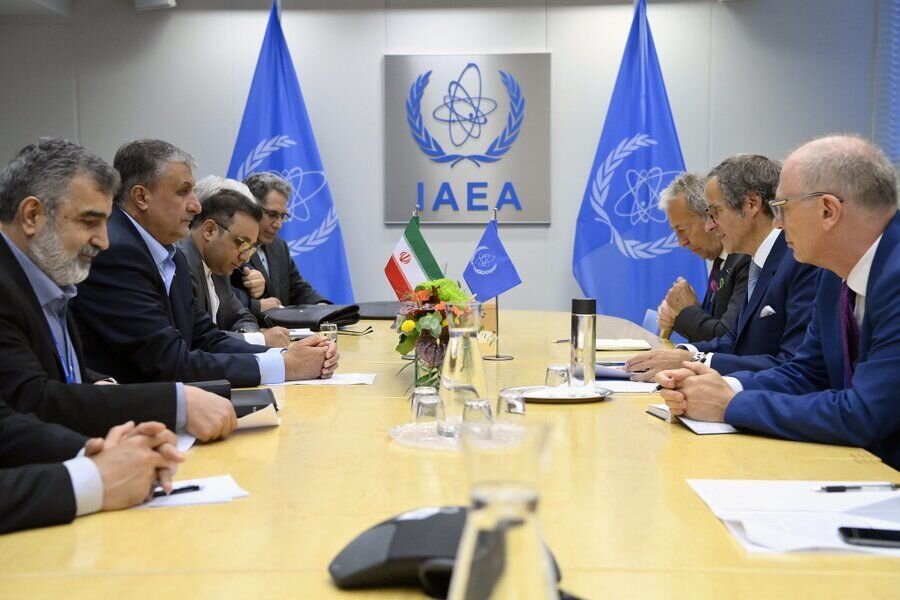Western political pressure on Iran ‘ineffective,’ nuclear chief says

TEHRAN- The head of the Atomic Energy Organization of Iran (AEOI) has criticized attempts by Western nations to put political pressure on the Islamic Republic, stressing that such actions lack any efficiency and will not go unanswered.
The comment was made by Mohammad Eslami at a meeting with Rafael Mariano Grossi, the director general of the International Atomic Energy Agency (IAEA), on Monday in Vienna.
Eslami decried the unfair stance that Western nations have adopted toward Iran, saying that by using sanctions “these countries are trying to use the IAEA’s mechanisms to mount pressure on Iran.”
“Brutal political pressures exerted by Western countries on Iran will not bear fruit and the Islamic Republic will not allow any politically-motivated pressure to go unanswered,” Iran's top nuclear official said.
He encouraged Grossi to guard the IAEA’s objectivity and professionalism and prevent the Western powers from using the Agency’s reports as justification for applying pressure on Iran.
The meeting took place as tensions between Iran and the IAEA rose following Tehran’s decision to ban some IAEA inspectors from France and Germany from being sent to Iran.
On September 16, the IAEA chief issued a statement condemning what he called Iran’s “disproportionate and unprecedented” move to withdraw the designation of the Agency’s several “most experienced” inspectors assigned to conduct “verification activities” in the country under the NPT Safeguards Agreement.
The move by Iran, according to Grossi, “affects the normal planning and conduct of Agency verification activities” in the nation and “openly contradicts the cooperation that should exist between the Agency and Iran.”
Nasser Kanaani, the spokesman for the Iranian Foreign Ministry, responded to Grossi’s claims by asserting that the U.S. and the three European signatories to the Joint Comprehensive Plan of Action (JCPOA), the official name for the 2015 nuclear agreement, have abused the UN nuclear watchdog to advance their political goals.
“Unfortunately, despite Iran’s positive, constructive and continuous interaction with the IAEA, the three European countries and the United States have abused the Agency’s Board of Governors for their own political purposes… with the aim of damaging the atmosphere of cooperation between Iran and the Agency,” Kanaani said in a clear reference to France, Britain and Germany.
On September 13, the IAEA Board of Governors also released a statement supported by the West in which Iran was charged with violating its safeguards obligations.
The document, which was signed by 62 IAEA members, urged Iran to take action to resolve remaining safeguards issues and to tell the Agency about its new nuclear facilities.
“IAEA prepared to make ‘concrete progress’ on Iran nuclear program”
After the meeting, the IAEA director wrote in a post on X, a social networking website formerly known as Twitter, that his meeting with Eslami was “important.”
“Important to engage with Mohammad Eslami, VP and Head of @aeoi_ir during #IAEAGC. I reiterated @IAEAorg willingness to engage and make concrete progress in the spirit of the March 4 statement to provide credible assurances that [Iran’s] nuclear programme is exclusively peaceful,” Grossi said.
The IAEA, he continued, is prepared to “engage and make concrete progress” in accordance with a deal struck on March 4 in Tehran, “to provide credible assurances that Iran’s nuclear program is exclusively peaceful.”
In a joint statement released at the conclusion of the IAEA director general’s two-day visit to Tehran in March, the two parties announced their agreement to take actions to promote collaboration and hasten the resolution of remaining safeguards issues.
According to the statement, both parties noted that such beneficial interactions between Iran and the IAEA can pave the way for larger accords among state parties.
